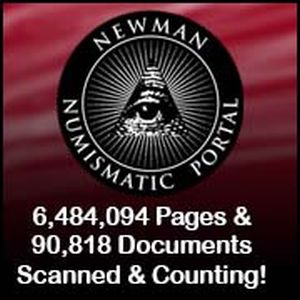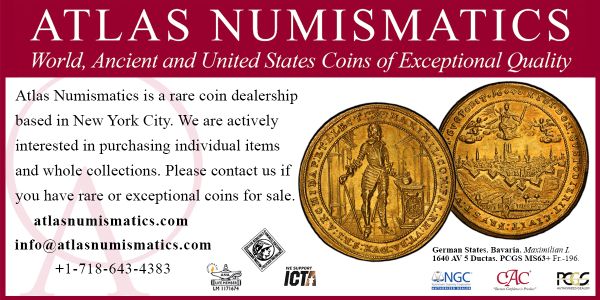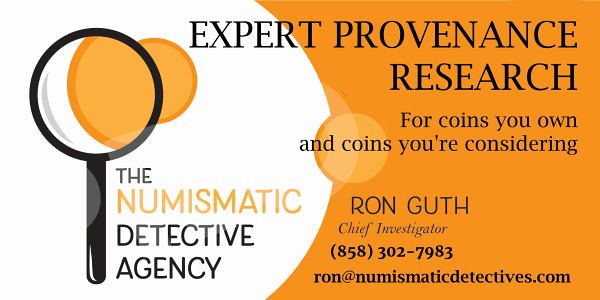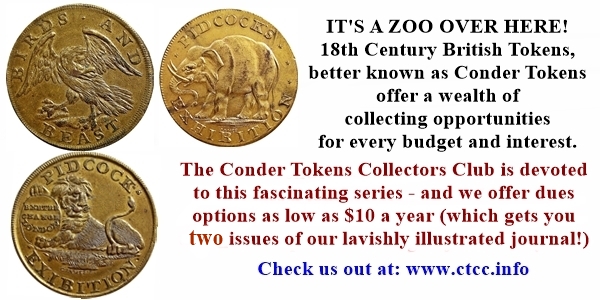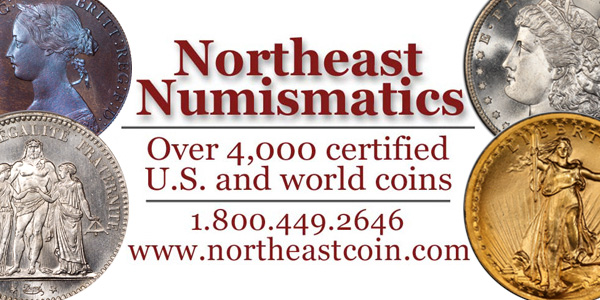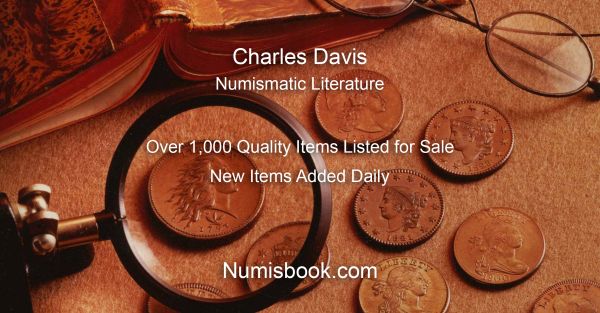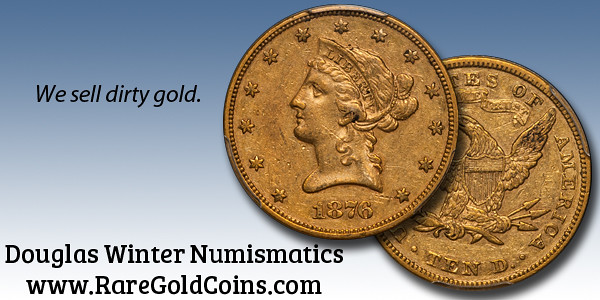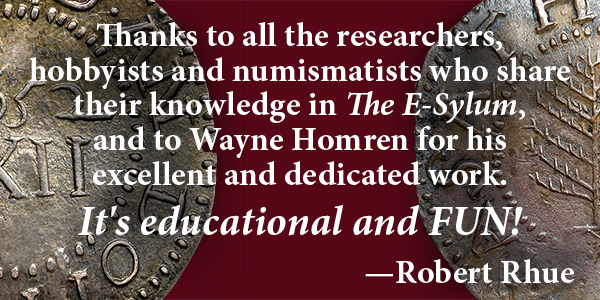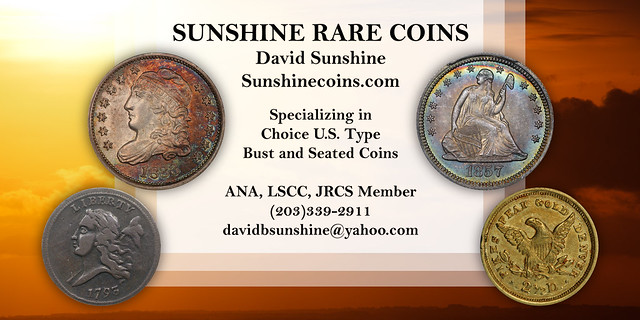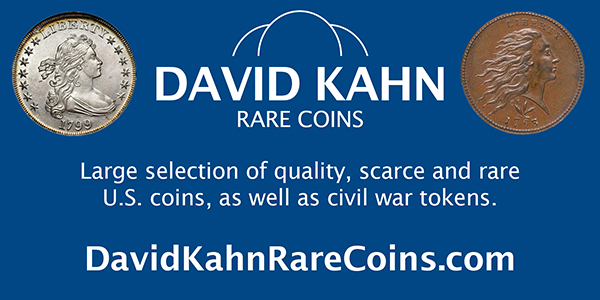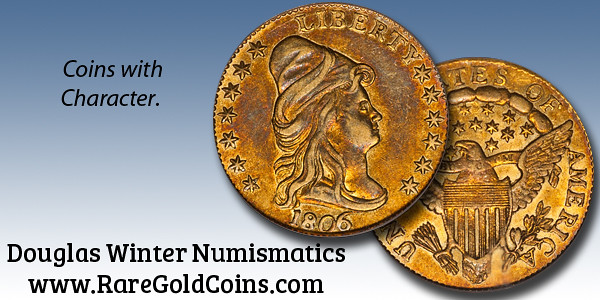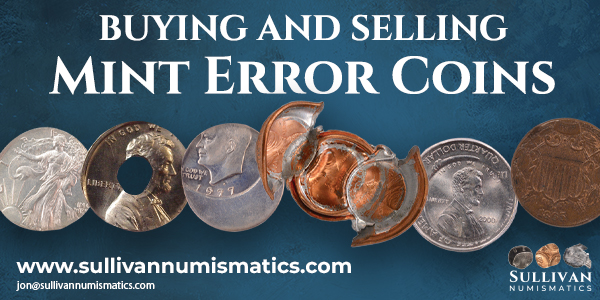
Visit our NBS Sponsors
About UsThe Numismatic Bibliomania Society is a non-profit association devoted to the study and enjoyment of numismatic literature. For more information please see our web site at coinbooks.org SubscriptionsThose wishing to become new E-Sylum subscribers can go to the following web page Subscribe MembershipThere is a membership application available on the web site Membership Application To join, print the application and return it with your check to the address printed on the application. Print/Digital membership is $40 to addresses in the U.S., and $60 elsewhere. A digital-only membership is available for $25. For those without web access, write to: Jeff Dickerson, Treasurer AsylumFor Asylum mailing address changes and other membership questions, contact Jeff at this email address: treasurer@coinbooks.org SubmissionsTo submit items for publication in The E-Sylum, write to the Editor at this address: whomren@gmail.com BUY THE BOOK BEFORE THE COINSale CalendarWatch here for updates! |
- WAYNE'S WORDS: THE E-SYLUM SEPTEMBER 14, 2025
- HOLABIRD SEPTEMBER 2025 SALE: LITERATURE
- NEW BOOK: COINS OF SCOTLAND, IRELAND AND THE ISLANDS, 5TH ED.
- NEW BOOK: THE 2026 CHARLTON COIN GUIDE
- AVAILABLE: CANADIAN NUMISMATIC BIBLIOGRAPHY
- NEW BOOK: ENCASED CENTS OF PUERTO RICO, 2ND ED.
- 1853-O NO ARROWS HALF DOLLAR AUTHENTICATION
- VIDEO: MODERN CHINESE COUNTERFEIT PANDEMIC
- BANK OF NEW YORK FUGIO EPHEMERA
- BROOKLYN BRIDGE CENTENNIAL MEDAL
- NOTES FROM E-SYLUM READERS: SEPTEMBER 14, 2025
- BOLIVIAN MONEY MUSEUM
- VOCABULARY TERM: ROLLED GOLD
- GEORGE FREDERICK GOULD (1912-1991)
- FULBRIGHT SCHOLARS IN NUMISMATICS
- HERITAGE: U.S. COLONIAL CURRENCY SHOWCASE
- ORIGINAL FRACTIONAL CURRENCY BRICKS
- EARLY AMERICAN HISTORY SEPTEMBER 2025 SALE
- EARLY AMERICAN HISTORY SEPTEMBER 2025 SELECTIONS
- SOVEREIGN RARITIES AUCTION XIX: THORBURN COLLECTION
- WILTSHIRE-AREA TOKEN COLLECTION OFFERED
- ARCHIVES INTERNATIONAL SALE 106
- STACK'S BOWERS: FALL 2025 MAASTRICHT AUCTION
- STACK'S BOWERS: HENGEVELD'S MAASTRICHT FAVORITES
- GADOURY OCTOBER 4, 2025 FRENCH COINAGE
- KUENKER AUCTION SALE 428
- STACKS BOWERS: KING ERIK EMUNE PENNY
- THE OTHER GEORGE MEDAL: FACIAT GEORGIUS
- WEST POINT CANCELS HANKS' THAYER MEDAL
- WWI PURPLE HEART MEDAL REUNITED WITH FAMILY
- LOOSE CHANGE: SEPTEMBER 14, 2025
- ABOUT THIS ISSUE: SEPTEMBER 14, 2025
Content presented in The E-Sylum is not necessarily researched or independently fact-checked, and views expressed do not necessarily represent those of the Numismatic Bibliomania Society.
WAYNE'S WORDS: THE E-SYLUM SEPTEMBER 14, 2025
 New subscribers this week include:
Charles Jonath, courtesy John Dannreuther;
David Geer, courtesy Chip Howell;
Jorge L. Crespo Armáiz,
Will Musgrove and
Shane Cheek.
Welcome aboard! We now have 6,979 subscribers.
New subscribers this week include:
Charles Jonath, courtesy John Dannreuther;
David Geer, courtesy Chip Howell;
Jorge L. Crespo Armáiz,
Will Musgrove and
Shane Cheek.
Welcome aboard! We now have 6,979 subscribers.
Thank you for reading The E-Sylum. If you enjoy it, please send me the email addresses of friends you think may enjoy it as well and I'll send them a subscription. Contact me at whomren@gmail.com anytime regarding your subscription, or questions, comments or suggestions about our content.
Our mailing list cleanup continues as obsolete and unwanted subscriptions drop off, but it's encouraging to see a rise in new subscriptions since we've moved to our new Mailchimp platform. I've had no issues reported to me.
This week we open with some numismatic literature in the Holabird Americana sale, three new books and one newly available one, updates from the Newman Numismatic Portal, and more.
Other topics this week include the coins of Scotland, Ireland and Canada, the encased cents of Puerto Rico, counterfeit coins, Fugio cent ephemera, the Brooklyn Bridge centennial medal, rolled gold, Fractional Currency bricks and bands, auction previews, a semi-official medal for surviving Guadalcanal, the Thayer medal, the Purple Heart, and more.
To learn more about J. S. G. Boggs, coins of China and India, canvas bank bags, a fake 1853-O No Arrows Half Dollar, an American medal picturing fireworks, a museum of Bolivian numismatics, Fulbright scholars in numismatics, colonial currency and a tricorn hat, encased postage stamps, the Edward III gold Leopard D'Or, Lahainaluna Seminary scrip, 6th Indiana Infantry Regiment sutler scrip, Felix Schlag's grave marker, Sydney Noe, Richard Doty, Steve Feller, the National Bank Fruitcake Find and the murdered numismatic book author, read on. Have a great week, everyone!
Wayne Homren
Editor, The E-Sylum
HOLABIRD SEPTEMBER 2025 SALE: LITERATURE
There's some numismatic literature and ephemera in the upcoming September 2025 Holabird Americana sale. Here are some sample lots. -Editor
Lot 3031: J. S. G. Boggs was an artist famous for creating currency artwork, which landed him legal troubles when accused of counterfeiting. Here is an accumulation about his work: the May 1994 Numismatist with cover story by Wayne K. Homren "A Collector's Encounter with J. S. G. Boggs." A hardbound copy of "Boggs: A Comedy of Values," by Lawrence Weschler; a hardbound copy of "Shapinsky's Karma, Boggs's Bills and other True-Life Tales" by Lawrence Weschler. J. S. G. Boggs smart money (hard currency), brochure from an exhibition organized by The Tampa Museum of Art.
Provenance: Fred Weinberg Numismatic Ephemera Collection
NEW BOOK: COINS OF SCOTLAND, IRELAND AND THE ISLANDS, 5TH ED.
A new edition of the Sovereign Rarities book on the coins of Scotland, Ireland and the Islands has been published. Here's the announcement. -Editor
 Sovereign Rarities Ltd of London, UK, are pleased to announce the brand new issue
of a revised edition for 2026 of the "Coins of Scotland, Ireland and the Islands
(Jersey, Guernsey, Man & Lundy) including Anglo-Gallic Coins" with a cover price of
$65 plus postage.
Sovereign Rarities Ltd of London, UK, are pleased to announce the brand new issue
of a revised edition for 2026 of the "Coins of Scotland, Ireland and the Islands
(Jersey, Guernsey, Man & Lundy) including Anglo-Gallic Coins" with a cover price of
$65 plus postage.
This landmark release represents the companion guide-book to the 2025 "Coins of England and the United Kingdom" issued in two volumes by Sovereign Rarities earlier this year (pre-decimal $49.95 and decimal issues $39.95). The UK-based company took over these titles by purchase from Spink in 2024 and the issue of this new volume completes full circle the premier release of the three hardback volumes in the series.
This book is the fifth edition since its original inception as a standalone volume under Seaby in the early 1980s, and though it is not an annual publication, it has been in more recent decades a once in circa five-year update, which is what we at Sovereign Rarities intend to produce, depending on prevailing market conditions.
NEW BOOK: THE 2026 CHARLTON COIN GUIDE
A new edition of the Charlton Coin Guide has been published. -Editor
The Charlton Coin Guide returns for 2026 with more than 232 pages of information to assist you in determining the value of your coins.
The Guide, which is the oldest continuously published buying guide in Canada compromises:
-
 Approximately 36 pages of buying price for coins used in circulation back to 1858
Approximately 36 pages of buying price for coins used in circulation back to 1858
- Modern collectable coins sold by the Royal Canadian Mint with valuations
- Paper money, which we use every day. All paper money listed is accompanied by buying price back to 1866
- Colonial Tokens used in Canada before Confederation in 1858
- Buying price of United States coins you may have in a dresser drawer. With the balance of pages covering the value of gold coins, the bullion value of gold and silver coins, and a small section on Military medals and awards
AVAILABLE: CANADIAN NUMISMATIC BIBLIOGRAPHY
Twelve years in the making, the important Canadian Numismatic Bibliography edited by Darryl Atchison is so thorough as to be more of an encyclopedia of Canadian numismatics. For those who missed the original subscription offer, some sets have been made available through CoinStampSupplies.com. -Editor
The Canadian Numismatic Bibliography is the definitive reference work for anyone collecting or researching Canadian coins, tokens, medals, or paper money. This monumental two-volume set—lavishly illustrated and meticulously annotated—spans over 1,200 large-format pages (8 1/2 x 11 inches) and represents more than twelve years of collaborative work by leading numismatic authors and researchers. Fewer than 50 sets remain from the original 2007 printing.
An essential tool for serious collectors, this bibliography covers more than four centuries of Canadian numismatic and economic history, including the French Regime, Pre-Confederation Coinage, Decimal Coinage, Patterns, Newfoundland Coinage, Banknotes, Biographies, Engravers, Trade Tokens, Medals, Collections, and much more. Each reference entry is supported by annotations and introductory essays to provide deeper context and insight.
Included is a searchable CD (produced in 2014) containing the full text—excluding images—allowing users to perform quick citation searches using Acrobat or Excel, significantly enhancing the book's usability beyond the printed index.
Please note: This title is sold at no commission by CoinStampSupplies.com to support the J. Douglas Ferguson Historical Research Foundation. As such, membership discounts do not apply.
Shipping is free, and orders will be fulfilled directly from the Foundation's publisher office in British Columbia. If your order includes additional items, they will be shipped separately by CoinStampSupplies.com.
NEW BOOK: ENCASED CENTS OF PUERTO RICO, 2ND ED.
Jorge Crespo has published a new edition of his General Catalog of Puerto Rico Encased Cents. Congratulations! Here is some background from the book's Preface. -Editor
 This catalog is focused on providing an overview and a comprehensive listing of the
known or reported "encased" cents or coins directly related to Puerto Rican merchants,
establishments, products, or special events. It is an update of the first work we published
exactly ten (10) years ago, at that time the first attempt to catalog these interesting and rare
pieces of our local exonumia.
This catalog is focused on providing an overview and a comprehensive listing of the
known or reported "encased" cents or coins directly related to Puerto Rican merchants,
establishments, products, or special events. It is an update of the first work we published
exactly ten (10) years ago, at that time the first attempt to catalog these interesting and rare
pieces of our local exonumia.
The term "exonumia" is relatively new. It is derived from the classical roots exo, (out of) in Greek, and nummus, meaning "coin" in Latin, thus, pieces or collecting material that are "outside of the category of coins or legal currency". According to the Token and Medal Society (TAMS), exonumia was defined by TAMS founding member and foremost authority in the field of token collecting, Russell Rulau, in 1960. By 1962 the term, along with the name exonumist, was adopted by TAMS, and by 1965 it was admitted in the Webster's Dictionary.2 In general, exonumia refers to collectible items that, although they may have some face value, are mostly private issues, not official or legal currency, nor authorized by any government, as coins and paper money. Under this broad definition, exonumia groups a wide and varied range of collecting fields: tokens (civil war, merchant, plantation, transportation, military, scrip, other), medals, casino chips, altered coins (love tokens, Hobo Nickels, elongated coins, encased coins), counterstamped coins, game counters, dog tags, and many others.
1853-O NO ARROWS HALF DOLLAR AUTHENTICATION
Newman Numismatic Portal Project Coordinator Len Augsburger provided the following report about how NNP resources helped identify a purported 1853-O No Arrows Half Dollar as a counterfeit. Thank you. -Editor
1853-O No Arrows Half Dollar Authentication
 The 1853-O No Arrows half dollar is a well-known rarity in the U.S. series, with four pieces known. The highest graded coin, at VF35, resided for many years in the Eliasberg collection and is currently owned by Dell Loy Hansen. The second highest graded piece, VG8, was discovered in recent years. A Newman Portal user recently forwarded for authentication images of a low-grade example. A check of the Bill Bugert reference on Liberty Seated half dollar varieties quickly betrayed this piece, as the mintmark is punched too high as compared to a genuine example. In this case, an 1858-O piece was likely altered to appear as an 1853.
The 1853-O No Arrows half dollar is a well-known rarity in the U.S. series, with four pieces known. The highest graded coin, at VF35, resided for many years in the Eliasberg collection and is currently owned by Dell Loy Hansen. The second highest graded piece, VG8, was discovered in recent years. A Newman Portal user recently forwarded for authentication images of a low-grade example. A check of the Bill Bugert reference on Liberty Seated half dollar varieties quickly betrayed this piece, as the mintmark is punched too high as compared to a genuine example. In this case, an 1858-O piece was likely altered to appear as an 1853.
VIDEO: MODERN CHINESE COUNTERFEIT PANDEMIC
The David Lisot Video Library on the Newman Numismatic Portal can be found at:
https://nnp.wustl.edu/library/multimediadetail/522852
We highlight one of his videos each week in The E-Sylum. Here's one from 2009 with Dr. Gregory Dubay speaking about Chinese counterfeits. -Editor
BANK OF NEW YORK FUGIO EPHEMERA
Tony Terranova passed along these images of ephemera relating to the Bank of New York hoard of Fugio Cents. It's the pamphlet that accompanies Fugios that were encased in a Lucite block. Thanks. -Editor
BROOKLYN BRIDGE CENTENNIAL MEDAL
Referencing a question from Len Augsburger, Scott Miller writes:
"Do you know if anyone ever found a US medal depicting fireworks? If not, I will send you the information and photo of a Brooklyn Bridge centennial medal with a fireworks display."
I don't believe we had a response. Here's what Scott sent along. Thanks! -Editor
Here is a link to an illustration of the event:
Bird's-Eye View of the Great New York and Brooklyn Bridge, and Grand Display of Fireworks on Opening Night...May 24, 1883
(https://www.metmuseum.org/art/collection/search/341751)
Here is a link to the Brooklyn Bridge Centennial medal issued in 1983; the reverse depicts an image of the Bridge on opening day with fireworks below.
THE BOOK BAZARRE
NOTES FROM E-SYLUM READERS: SEPTEMBER 14, 2025
Countries With an X In Their Name
The first reader response to last week's issue was in reply to the very last thing I asked - the non-numismatic cocktail party question, "Can you name the only two countries in the world with an X in their name?"
Pete Smith was the first reader with the correct answer: Luxembourg and Mexico. Chip Howell was the second, on Tuesday afternoon. Thanks. -Editor
To read the earlier E-Sylum article, see:
ABOUT THIS ISSUE: SEPTEMBER 7, 2025
(https://www.coinbooks.org/v28/esylum_v28n36a26.html)
Other topics this week include Saxton's 1839 Photo From the U.S. Mint. -Editor
BOLIVIAN MONEY MUSEUM
In conjunction with Bolivia's bicentennial, Bolivian collector Víctor Borda and his family are displaying his collection of over 3,000 pieces covering over 8,000 years of monetary history in a hall in his hometown of Cochabamba. Found via News & Notes from the Society of Paper Money Collectors (Volume XI, Number 12, September 2, 2025). -Garrett
To mark Bolivia's bicentennial, a family in Cochabamba has opened a door onto 8,000 years of value—stones, salt, coca leaves, silver reales, banknotes swollen by hyperinflation, even tokens for bitcoin. For collector Víctor Borda, money is no longer just an artifact. In his hands, it has become a memory Bolivians can touch.
A childhood hobby becomes a bicentennial museum.
Inside a bright hall in Cochabamba, coins gleam in ordered runs of copper and silver while banknotes fan out like pressed flowers. Together, they comprise the Borda-Luna collection, nearly 3,000 pieces that trace humanity's attempt to measure worth—from primitive exchange objects to digital-age medallions.
Its architect, 74-year-old Borda, began the hunt with a child's curiosity. "I started collecting at age 10 or 11; it was a wholesome pastime, and here I am," he told EFE, smiling at how a boy's diversion turned into a lifelong pursuit.
The obsession deepened between 2004 and 2009, when Borda lived in the United States and gained access to pieces so rare he once flirted with chasing a Guinness World Record. Family duty brought him home, but it also gave the collection its true purpose. Together with his wife, Sara Luna, he cataloged every piece—first by hand, then on a typewriter, later on a computer—so that, as he put it to EFE, "my people can see the world without paying a cent." In a country where most citizens may never travel beyond the Andes, the museum offers a passport stamped in silver, paper, and polymer.
VOCABULARY TERM: ROLLED GOLD
Here's another entry from Dick Johnson's Encyclopedia of Coin and Medal Terminology. -Editor
Rolled Gold. A kind of gold filled – clad gold to a base metal, then rolled to required thickness – but of a gold content less than 1/20th total weight. There is more gold on a rolled gold object than one that is goldplated, even heavy coldplate but less than one that is gold filled. Rolled gold is abbreviated R.G.P. This is usually edgelettered on a medallic item.
GEORGE FREDERICK GOULD (1912-1991)
E-Sylum Feature Writer and American Numismatic Biographies author Pete Smith submitted this article on Merchant Tokens of Montana author George Gould. Thank you. -Editor
 How many American numismatic book authors were the victim of murder? I am aware of one,
George Frederick Gould. He was the author of Merchant Tokens of Montana 1889-1939. It was
published in 1978 with a plastic comb binding and 170 pages.
How many American numismatic book authors were the victim of murder? I am aware of one,
George Frederick Gould. He was the author of Merchant Tokens of Montana 1889-1939. It was
published in 1978 with a plastic comb binding and 170 pages.
The Lewis County (WA) Sheriff responded to a call on November 6, 1991. George F. Gould, 78, of Curtis, Washington, was found dead in his Chevrolet Suburban on International Paper Co. Road a quarter mile east of Wildwood, Washington. The car was found stalled up against an embankment.
An autopsy was performed and found that Gould had died from blows to the head. The Sheriff called the death suspicious.
FULBRIGHT SCHOLARS IN NUMISMATICS
Jeff Burke submitted this article on Fulbright Scholars in the numismatic world. Great topic - thanks. -Editor
Many years ago, during my graduate studies, I was fortunate to receive a Fulbright-Hays Award for a summer Arabic language program in Jordan. Out of curiosity, I recently conducted a search on the Newman Numismatic Portal (NNP) and other sources for names of numismatists who also won Fulbright Awards. Here are a number that I came across, starting with the earliest Fulbright scholar I could find.
1. Charles A. Hersh (England 1950)
2. Sydney P. Noe (Greece 1952-1953)
3. Theodore V. Buttrey (Italy 1953; Denmark 1985)
4. Richard G. Doty (Spain 1964)
5. Peter P. Gaspar (Portugal 1973)
6. Steve Feller (England 1996)
7. Madisen Caster (England 2020)
The Fulbright Program was created in 1946. It was founded through the legislative efforts of J. William Fulbright, U.S. Senator from Arkansas, who wanted Congress to establish an international exchange program to promote cultural understanding, friendship and peace between nations. This program is administered by the U.S. Department of State. In 1961, President Kennedy signed the Fulbright-Hays Act, to reauthorize and strengthen the Fulbright Program. This Act also created Fulbright-Hays Awards, which are administered by the U.S. Department of Education. (www.fulbrightprogram.org/about/timeline/).
HERITAGE: U.S. COLONIAL CURRENCY SHOWCASE
Heritage Auctions will be hosting their U.S. Colonial Currency Showcase on September 14. Select items are discussed below. -Garrett
Vermont February 1781 2s 6d PMG Very Fine 20 Net. All Vermont notes are very rare and most known examples are in extremely low grade. The majority of the known examples have been pieced together from several different notes, often of different denominations. They were printed on thin, weak paper that quickly disintegrated in circulation. Their scarcity is due to the fact that only a single issue was emitted, and that issue, authorized in February 1781, had its legal tender status revoked after a little more than a year in circulation. While this offering has been severed and reattached and repaired, it retains a very attractive appearance with boldly printed details on both face and back along with legible signatures. It is a more than acceptable example of a very rare Vermont note.
To read the complete item description, see:
Vermont February 1781 2s 6d PMG Very Fine 20 Net.
(https://currency.ha.com/itm/colonial-notes/vermont/vermont-february-1781-2s-6d-pmg-very-fine-20-net/a/62410-94405.s)
ORIGINAL FRACTIONAL CURRENCY BRICKS
A website visitor alerted us to another interesting Heritage currency offering. -Editor
Shane Cheek writes:
"Check this out! Heritage Auctions has a fractional currency grouping called the National Bank Fruitcake Find. These bricks and bundles in this grouping were from the National Bank of Athens, Georgia. The currency had been stored in a fruitcake box for nearly 50 years. There are 12 lots, and each lot description provides a bit of the story.
"I found your article about fractional currency bands and thought that you would like to see this grouping."
EARLY AMERICAN HISTORY SEPTEMBER 2025 SALE
Here's the press release for the upcoming Early American History Auctions sale. Many nice numismatic lots as well as some great autographs, manuscripts and other interesting material. -Editor
Early American History Auctions lives up to its namesake once again with an offering of 216 lots, including numerous important and unique items. This auction is presented online only on its website and through the Invaluable auction platform. The array covers multiple collecting fields, including historic autographs, engravings, documents, US Navy, Colonial and Revolutionary War documents, Continental and Colonial currency, George Washington, Federal period, Abraham Lincoln and Civil War encased postage stamps and artifacts, Black history, historic maps, plus political and decorative Americana. Absentee bidding has already opened, with the sale closing on September 20 at noon.
EARLY AMERICAN HISTORY SEPTEMBER 2025 SELECTIONS
Here are some additional lots that caught my eye in the upcoming Early American History Auctions sale. -Editor
c. 1825 Official Seal of the United States Pendant Seal used for Treaties, 4+11/16" in diameter, Red Wax and its original impressed Red Silk Ribbon partially attached, smooth reverse, by Seraphim Masi of Washington D.C., Choice Extremely Fine.
SOVEREIGN RARITIES AUCTION XIX: THORBURN COLLECTION
Sovereign Rarities will hold their Auction XIX on Tuesday September 23rd. Here are more selected lots, primarily from the Thorburn Collection. -Editor
Sovereign Rarities proudly present their 19th Auction to be held at their London office on Tuesday 23rd September in conjunction with the Royal Mint. The online catalogue is now available to view at www.sovr.co.uk with images and estimates of every lot.
The sale commences with the magnificent Thorburn Collection of coins of 1887 mostly struck for the Golden Jubilee of Queen Victoria. This collection consists of over 200 coins arranged in 198 lots to begin the auction and covers everything numismatic from the Royal Mint medallions for the Jubilee and all the denominations in use for 1887 from the senior gold Five Pounds to the more lowly bronze Farthing as well as many patterns and proofs produced at the time for Adolph Weyl, J. Rochelle Thomas and Spink. The sale now has its own pdf flipbook with all relevant introductory passages at this link SOVR Auction XIX - Featuring the Thorburn Collection - Flip Book Catalogue
WILTSHIRE-AREA TOKEN COLLECTION OFFERED
In England, tokens produced by local businesses were used as currency for centuries. A large number of them from the Wiltshire region of England, where the collector lived, are set to go under the hammer by RWB Auctions in Royal Wootton Bassett, Wiltshire, England on September 24. -Garrett
"During periods where there isn't much official currency around, local businesses tend to step in and create their own little tokens. So these would have been exchanged for people shopping, to pay people," she said.
A large private collection featuring hundreds of tokens is being sold at the auction house on 24 September. The coins date from the 1600s to the 1950s, with the majority from businesses and towns in Wiltshire.
They would have been made all over the country, all unique to their own area, but this collector lived in Wiltshire.
A few in the collection from the 1600s are tiny, but very clean. Swindon can be clearly seen on one, with the name William Heath, and another is from Devizes.
ARCHIVES INTERNATIONAL SALE 106
Here are some selected lots from the September 24 sale by Archives International Auctions. -Garrett
Czechoslovakia, 1929. 500 Korun, P-24s, Specimen Banknote, Red on m/c underprint with arms at left and WWI Czech Legionnaire at right, Back is red on m/c with woman's head at center flanked by lion and child, Pin punched Specimen at top, S/N E-283648, Legacy graded Gem New 65PPQ with comment "Perforated Cancelled," ABNC.
To read the complete item description, see:
Czechoslovakia, 1929. 500 Korun, P-24s, Specimen Banknote,
(https://auction.archivesinternational.com/Czechoslovakia-Narodni-Banka-Ceskoslovensk-1929-Specimen-Banknote_i57876267)
STACK'S BOWERS: FALL 2025 MAASTRICHT AUCTION
Stack's Bowers will be hosting their Fall 2025 Maastricht Auction of world paper money on October 2. Select items are discussed below. -Garrett
BAHAMAS. Bahamas Government. 100 Dollars, 1965. P-25b. PMG Very Fine 30. While in rarity it is perhaps equal to the previous lot, the $100 1965 is certainly a true highlight, as we have never sold this variety at auction before, even if we have handled some of the great Commonwealth rarities. Just two examples have been graded in the PMG population report, compared to a rather large quantity of 19 notes of the two-signature variety, which is still a scarce and popular type. The $100 notes from the Bahamas are a bit of an anomaly in the world of paper money. Even though they were printed in reasonably large quantities, up to the late 1990s, their issuance was done rather inconsistently, and all $100 notes (even those printed in the 1990s) are very scarce. Tourists, many of whom come from the United States, will typically use U.S. Dollars, and few would see the local Bahamian currency. The local population had relatively little need for higher denominations, especially in the late 1960s, and small quantities would be distributed to local banks on the various islands, which were enough for local commerce. As a result, dealers and collectors acquired few, and most types are rare.
Of course, that does not quite explain the rarity of this note, one theory of which we have outlined in the previous lot. There is no doubt that this is a great rarity, and along with the $50 with triple signatures, this represents an exceptional opportunity. Even the greatest Commonwealth collectors have been unable to acquire this variety, despite their relatively recent issuance. Thankfully, even though this note spent some time in circulation, it is entirely intact and problem-free. It faces up well with considerable originality left. We can't stress enough the rarity of this note and have to mention that this is one of those that we urge you to strongly consider, as you don't want to regret placing just one more bid before the gavel falls on this lot.
To read the complete item description, see:
BAHAMAS. Bahamas Government. 100 Dollars, 1965. P-25b. PMG Very Fine 30.
(https://auctions.stacksbowers.com/lots/view/3-1LI0T9/bahamas-bahamas-government-100-dollars-1965-p-25b-pmg-very-fine-30)
STACK'S BOWERS: HENGEVELD'S MAASTRICHT FAVORITES
Also regarding the Maastricht Sale, Stack's Bowers Director of Consignments & Senior Numismatist Dennis Hengeveld published this article about some of his personal favorite items in the sale in the firm's Paper Money of The Week column. -Garrett
By now, you have probably seen the online catalog of the Fall 2025 Maastricht Showcase Auction, and printed catalogs will be in the mail shortly. In this blog, we will look at five notes that I personally like, for various reasons. If you have been reading these blogs for a while, you know that I have a keen interest in history, and I like several of these notes for their historical aspects. Others I like for their eye appeal or because of their rarity. As a result, these are not necessarily the most expensive notes in the sale, but notes that I think you should pay attention to.

Lot 50018 – BELGIAN CONGO. Banque du Congo Belge. 5 Francs, 4.4.1930. P-8e. PMG Choice Uncirculated 64 EPQ.
This is a type that I have always been fond of, thanks to its pastel colors and tranquil scenes on both sides. A note with relatively modest face value, most seen in the marketplace today are in heavily circulated condition, and uncirculated examples are scarce. This example stood out to me because of the ‘EPQ' designation, indicating total originality, an exception to the rule, as these notes often have staining, pinholes, or other problems.
GADOURY OCTOBER 4, 2025 FRENCH COINAGE
Monaco's Gadoury Auctions will be selling a number of important French coins as part of their annual floor auction on October 4, 2025. Here are some selections. -Garrett
Philip VI 1328-1350 Golden Pavilion, issue of June 8, 1339, AU 5.07 g. Obverse: The king seated facing forward on a curule chair holding a fleur-de-lis scepter Reverse: Leafy and fleur-de-lis cross in a quatrilobe quartered with four crowns. Ref: Dup. 251, Fr. 266, L.254 Grading: PCGS MS 64 Conservation: FDC. Gorgeous
To read the complete item description, see:
Philip VI 1328-1350 Golden Pavilion, issue of June 8, 1339, AU 5.07 g.
(https://www.biddr.com/auctions/gadoury/browse?a=6119&l=7521974)
KUENKER AUCTION SALE 428
On 8 and 9 October 2025, auction 428 will take place. Among other highlights, it contains a special collection presenting more than 40 lots from Malta. The time span ranges from the High Middle Ages to the end of the Order state during the French Revolution. -Garrett
The coins and medals on offer feature not only portraits of the Grand Masters of the Sovereign Military Hospitaller Order of Saint John. We repeatedly encounter the Order of Knights' patron saint, St. John, or rather his head, which is usually depicted lying on a platter. Such depictions are also known from sculpture. Many Order churches had three-dimensional reminders of the beheading caused by Salome, some of which still exist today.


No. 1116: Sovereign Military Order of Malta. Juan de Omedes, 1536-1553. 4 tari, 1662, Birgu or Fort St. Angelo. Very rare. Very fine to extremely fine. Estimate: 7,500 euros
STACKS BOWERS: KING ERIK EMUNE PENNY
Stack's Bowers Senior Numismatist Henrik Berndt published this article about a penny from Danish King Erik Emune (1134-1137) in the firm's World Coin of The Week column. It will be sold as part of the L. E. Bruun Collectors Choice Online Auction, September 22-23. -Garrett
Some coinages seem to hint at special occasions, at a specific event that we may or may not recognize. One such item is a Penny from King Erik Emune (1134-1137), which Stack's Bowers Galleries is offering as lot 17035 in the L. E. Bruun Collectors Choice Online Auction, September 22-23, 2025. It may quite possibly have been struck to commemorate the Battle of Fotevik (Fodevig) in Scania in 1134.
In the battle, Erik Emune defeated the armies of King Niels and his son Magnus with the help of 300 German mercenary knights. Magnus died in the battle as did five bishops on Niels' side; Niels himself fled to the city of Schleswig where he was soon murdered by the inhabitants. Erik Emune won the Danish throne, even if he held it for only four years.
The coin in question, struck by King Erik, depicts on the reverse a rider wearing a crown, galloping right with his sword drawn and a cross before his face. It is an enticing thought that it might commemorate his victory at Fodevig. As a coin type, the rider is quite unique for Denmark and breaks tradition in not depicting a cross or another Christian symbol as the central element. This fits the Battle of Fodevig, where the use of cavalry also broke tradition and is regarded as the first Danish battle in which cavalry was used.
THE OTHER GEORGE MEDAL: FACIAT GEORGIUS
The George Cross and George Medal are the two highest civilian honors in the U.K. The U.S. Marines have a George Medal as well - one born in black humor over the depressing situation of the brutal WWII campaign on Guadalcanal. Here's an excerpt from a Military Times based on an item in the collection of the National WWII Museum in New Orleans. -Editor
"One miserable night on that crocodile-infested island, a few officers decided the division deserved a medal — not for heroism in the traditional sense, but simply for surviving that dreadful place," writes Chase Tomlin for the National World War II Museum.
What started as a jest soon became cast in bronze.
WEST POINT CANCELS HANKS' THAYER MEDAL
Here's the story of a more recent medal that was announced, then renounced. -Editor
The alumni association at the U.S. Military Academy at West Point has canceled an award ceremony for actor and veterans advocate Tom Hanks, citing a desire for the Army service academy to focus on preparing future officers for war after several political controversies involving the Trump administration shook the institution this year.
Retired Army Col. Mark Bieger, president and chief executive officer of the West Point Association of Graduates, disclosed the decision in an email to faculty circulated Friday. A copy of Bieger's message was reviewed and verified by The Washington Post.
WWI PURPLE HEART MEDAL REUNITED WITH FAMILY
On a more uplifting note, the Commonwealth of Massachusetts has helped reunite a Purple Heart medal with the recipient's family. -Editor
"I was asked last week by a lot of people, 'Why does this matter?' and 'Why are we putting so much work into trying to return these medals?'" she said. "These people were willing to give it all on behalf of all the rest of us here in this country. That kind of sacrifice deserves honor, it deserves respect and it deserves to be passed down through the generations."
Long thought to have been stolen, the Purple Heart medal that Worcester native Thomas Flynn was awarded for his World War I service was returned to his family at the State House Tuesday, Sept. 9, the latest reunification arranged by Treasurer Deborah Goldberg's Unclaimed Property Division.
The medal landed with the Unclaimed Property Division decades ago. It had been inside a safe deposit box under the name of Flynn's wife, Mary, who died in 1992. When the contents went unclaimed, the state took custody.
LOOSE CHANGE: SEPTEMBER 14, 2025
Here are some additional items in the media this week that may be of interest. -Editor
A large hoard of mostly copper 17th-century coins has been unearthed in Poland. -Editor
A remarkable discovery was made near the village of Zewierszczów in the Lublin Voivodeship of Poland, when a local metal detectorist came across a hoard of thousands of mid-17th-century coins.
The find was uncovered by Grzegorz Panek, a member of the Hrubieszów Historical–Exploration Association "GROSSUS," who has been engaged for years in official searches for objects of historical value under conservation permits. In the process of investigating a strong signal from his detector, Panek unearthed several copper coins near the surface. What at first appeared to be scattered pieces soon revealed itself as part of a very large hoard. Additional coins poured out of the ground as he dug, eventually totaling some 5,000 specimens by estimation.
Preliminary analysis suggests that most of the hoard dates from the years 1650–1657, during the reign of King Jan II Kazimierz. Most of the copper coins are so-called "boratynki," small-denomination currency minted in huge numbers for both the Crown and the Grand Duchy of Lithuania. They are named for Tito Livio Burattini, the royal official who organized their minting. Although modest in value in their time and still common among collectors today, the quantity of the find gives researchers a rare window into the circulation of everyday currency in early modern Poland.
To read the complete article, see:
Large 17th-century coin hoard unearthed in eastern Poland
(https://archaeologymag.com/2025/09/17th-century-coin-hoard-eastern-poland/)
Other topics this week include art vending machines, and Felix Schlag's grave marker. -Editor
ABOUT THIS ISSUE: SEPTEMBER 14, 2025
 On Tuesday Google invited me to try its AI image generator. I asked it to "Create an image of a gold coin circa 1750 with the head of a King with a handlebar mustache and mole on his right cheek. The date is 1783 and the inscription around the edge is Latin for "nothing ventured, nothing gained."
On Tuesday Google invited me to try its AI image generator. I asked it to "Create an image of a gold coin circa 1750 with the head of a King with a handlebar mustache and mole on his right cheek. The date is 1783 and the inscription around the edge is Latin for "nothing ventured, nothing gained."
Not too darn bad for a first shot. They say you can tell it to make corrections, but I gave up after twice asking it to fix that date. I ran the inscription "Nil atctum reputes si quid supperssdum" through Google Translate and it said the English translation is "Don't consider anything touched if something is left behind." Not so good, but damn, it created a convincing curved legend around the coin. This could be fun to play with.
I've felt behind the eight ball since before the ANA convention, but this week I've been getting caught up on some submissions that had gotten stuck in my inbox. I still haven't managed to write my ANA Diary, but I did at least manage to upload my photos to our Flickr archive, so that's a start.
Quote of the week, from today's Dustin cartoon: "Well, aren't you just a vast suppository of information..."
Finally, here's an interesting non-numismatic history article I came across this week.
6 Fascinating Facts About the Telephone (https://interestingfacts.com/telephone-facts/?lctg=fc99d453-51bd-454f-b10d-ed4d7ce03f91)
-Editor

